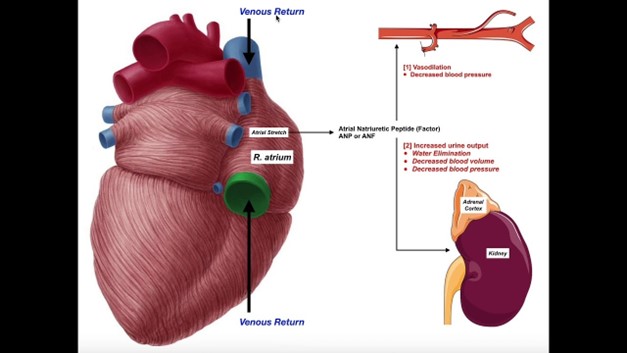An atrial natriuretic peptide is a hormone that:
Is released from the adrenal cortex and stimulates atrial hormones.
Is stimulated to release when blood volume decreases.
Raises blood pressure.
Inhibits the release of renin and aldosterone.
The Correct Answer is D
Atrial natriuretic peptide (ANP) is a hormone secreted by the heart when the atria are stretched by high blood pressure or volume.

ANP has multiple effects, such as increasing urine and salt excretion, lowering blood pressure, and opposing the renin-angiotensin-aldosterone system.
Therefore, ANP inhibits the release of renin and aldosterone, which are hormones that increase blood pressure and sodium retention.
Choice A is wrong because ANP is not released from the adrenal cortex but from the cardiac atria.
ANP does not stimulate atrial hormones but rather inhibits them.
Choice B is wrong because ANP is not stimulated to release when blood volume decreases, but when it increases.
ANP acts to reduce blood volume by promoting diuresis and natriuresis.
Choice C is wrong because ANP does not raise blood pressure, but lowers it. ANP acts as a vasodilator and reduces peripheral resistance.
Nursing Test Bank
Naxlex Comprehensive Predictor Exams
Related Questions
Correct Answer is B
Explanation
Innate defenses counter specific disease-causing agents, whereas adaptive defenses include mechanical and chemical barriers.
Choice A is wrong because it confuses the two types of defenses.
Innate defenses are nonspecific and include physical barriers such as the skin, molecules that are toxic to invaders, and phagocytic cells that ingest invaders.
Adaptive defenses are specific and are activated by the innate immune system.
They involve the production of antibodies and specialized cells that recognize and eliminate specific pathogens.
Normal ranges are not applicable in this question as it is about the definitions of innate and adaptive defenses.
Correct Answer is A
Explanation
The correct answer is choice A. True.
Blood flow through a capillary is controlled by a precapillary sphincter, which opens or closes due to the requirements of the cells supplied by the capillary.
This allows blood to bypass the capillaries when they are not needed and to increase blood flow when they are needed.
Choice B. False is wrong because it contradicts the true statement in choice A. A precapillary sphincter is a ring of smooth muscle that surrounds the entrance of a capillary and regulates blood flow into it.
It is influenced by local factors such as oxygen, carbon dioxide, pH, and temperature.
Whether you are a student looking to ace your exams or a practicing nurse seeking to enhance your expertise , our nursing education contents will empower you with the confidence and competence to make a difference in the lives of patients and become a respected leader in the healthcare field.
Visit Naxlex, invest in your future and unlock endless possibilities with our unparalleled nursing education contents today
Report Wrong Answer on the Current Question
Do you disagree with the answer? If yes, what is your expected answer? Explain.
Kindly be descriptive with the issue you are facing.
